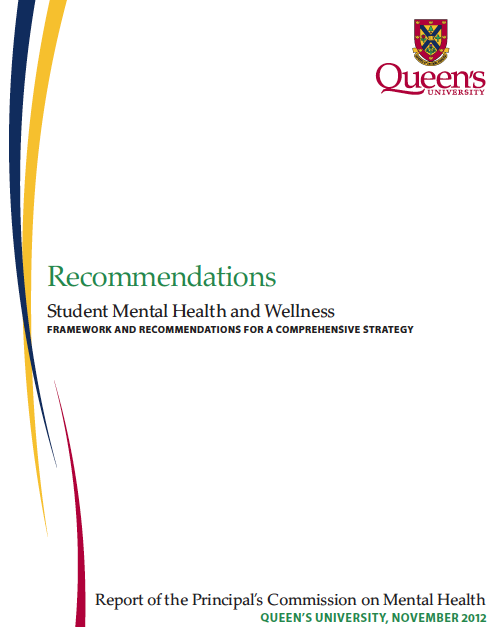Change the conversation, support rabble.ca today.
It seems fitting to write about depression at this time of year.
While there are lots of triggers for depression, capitalism has ensured that our bank accounts either drive or exacerbate our emotions. During December, this translates into weeks of anxious planning to try and meet the expectations of people around us, most of whom have also been infected with the capitalist virus, eating their brains and removing the little voice that says “this obsession with accumulating shit is probably going to kill you and everyone you love.” Add to these stresses the difficulties of being a student and you have a potentially explosive situation.
Any recommendations that attempt to alleviate peoples’ mental health that doesn’t address this context will never be sufficient.
Instead, like a knee that’s been torn open by a fall, pusing and bruised, bloodied and full of sand, a recommendation to address mental health that doesn’t address the root problem is like taking a bandaid and sticking it into the middle of your dirty knee.
Even if the bandaid if of the highest quality, it’s not going to fix you up.
This was the mental image I held while reading the report “Student Mental Health and Wellness, framework and recommendations for a comprehensive strategy” from Queen’s University. It was released at the end of November and, with Idle No More exploding across Canada and my own exams to prepare for, I’ve only gotten to reading this report now.
When I saw “comprehensive” I was hopeful that indeed, this report would be comprehensive. But, like is so often the case when university administrators try to fix students’ problems, the report fails to address any of the root causes of the deteriorating mental health of students.
Of 55 recommendations, not one mentions tuition fees or oppression as having anything to do with depression. Not one.
Instead, the report is full of pilot program ideas and recommendations like ensuring that pharmacists on campus are paying attention to their clients, creating an “adopt a grandma/grandpa” program, or changing the name of Campus Security (because if you’re in crisis, a private security guard at Queen’s may be your best supporter!)
Pretending that tuition fees are not either the primary factor or a driving factor of students’ mental health is at best ignorant and at worst, a dangerous lie.
Administrators like Queen’s president Daniel Woolf are the loudest advocates, the most shameful cheerleaders of high tuition fees in Ontario. Their advocacy is driving their students’ depression. It’s embarrassing that they would even enter into such a discussion, let alone stand behind recommendations that obscures students’ real experiences.
While I was at Ryerson, we held sessions for students who were failing their courses to intervene before they would be forced to leave their programs. The most common reasons for students struggling were these: personal tragedy or crisis during the semester (death of a parent/fire/etc.), being in a program that they should not have been in (for a variety of social and familial reasons) and a variety of stresses driven by financial pressures. For students in the first category, the university’s policies made it nearly impossible for them to stay on track academically. Their crises were usually exacerbated by the fact that their tuition/living expenses surpassed $15,ooo.
Students in the third category were the highest represented at these sessions, and it was no surprise. With the highest tuition fees in Canada, high costs of living and no room for mistakes, Ontario students are under more stress than any generation before them or any other student in Canada.
God forbid you fail a class: that will cost you more than $1,000. Lose a semester and you’ve essentially thrown 80 $50 bills down a sewer grate.
What 19-year-old should have to study under such stress?
What university administrator can look at the faces of their students and not feel an overwhelming sense of shame?
Oppressive structures are also a driver of depression: institutional racism, transphobia, sexism, homophobia, ableism and social isolation (especially for international students who are also paying three to four times the tuition fees that domestic students pay). When the intersection of these oppressions are considered in tandem with the economic segmentation of Canadian society, marginalized students are dealt a double set of barriers prohibiting their successful persistence in higher education.
Pretending that these structures don’t exist is rendering them invisible, further marginalizing the students this report claims to help.
I should stress: some of these recommendations are useful and will help some students, if implemented. After all, even the most cynical exercise in public relations can sometimes produce a useful recommendation or two.
But if anyone in the university community thinks that Queen’s is addressing students’ mental health by pretending financially-driven depression and systemic oppression are not two of the biggest factors driving students’ mental health, they’re wrong.
The focus on mental health at Queen’s was sparked by six student deaths on campus in 2011, three that were confirmed suicides. In response, students were frustrated and outraged with the lack of supports on campus.
As if existing in another world, President Woolf wrote in a letter that was accidentally leaked that he looked forward to leveraging these tragedies to encourage corporate donations from companies like Bell Canada.
You couldn’t invent a response as blunt or offensive as this.
Talking about mental health is not easy and addressing students’ mental health is even harder. These issues are multifaceted. But if the drivers of student depression are not only ignored, but encouraged and exploited by university administrators, they must be held to account.
Their shameful actions are hurting the students who pay their outrageous salaries.
And this deeply depresses me.




